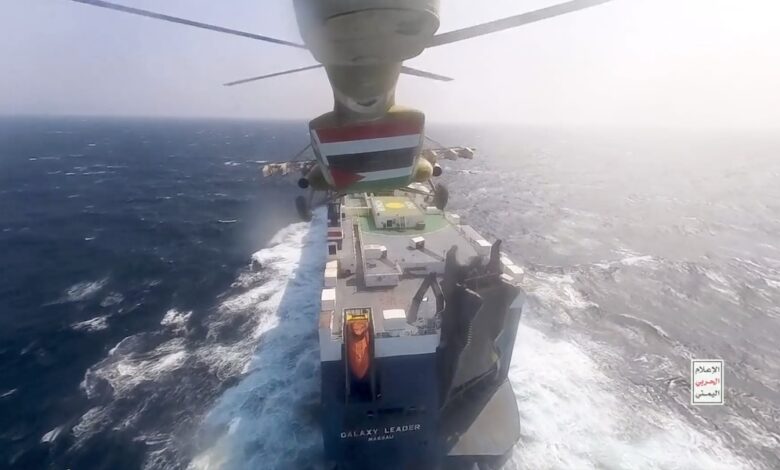Military action against land-based targets in Yemen moves a step closer

A coalition is moving closer to taking military action against land-based targets in Yemen after more than 20 merchant ships have been targeted in recent weeks in the waters of the southern Red Sea.
Houthi strikes via drones and missiles at merchant shipping, backed by Iranian firepower and intelligence, in the wake of Israel’s war in Gaza have dominated shipping headlines for the past six weeks with one in five ships now electing to avoid the Red Sea and take longer routes via southern Africa. The attacks have continued despite the arrival of many naval ships from multiple countries recently.
Yesterday, the governments of the United States, Australia, Bahrain, Belgium, Canada, Denmark, Germany, Italy, Japan, Netherlands, New Zealand, Singapore, and the United Kingdom, called for the immediate end of these attacks.
“The Houthis will bear the responsibility of the consequences should they continue to threaten lives, the global economy, and free flow of commerce in the region’s critical waterways. We remain committed to the international rules-based order and are determined to hold malign actors accountable for unlawful seizures and attacks,” the joint statement warned.
The World Shipping Council, the International Chamber of Shipping and BIMCO – three of the world’s largest global shipping organisations – expressed their thanks to the 12 nations for yesterday’s statement.
In a joint statement, the shipping associations called on all nations and international organisations to protect seafarers, international trade in the Red Sea, and to support the welfare of the “global commons by bringing all pressure to bear on the aggressors so that these intolerable attacks cease with immediate effect”.
Members of the United Nations Security Council on Wednesday called on the Houthis to halt their attacks, which have spread beyond the Red Sea towards waters near India.
Addressing the council’s first formal meeting of 2024, members also demanded that the Houthis release the Galaxy Leader, a Japanese-operated car carrier (pictured) linked to an Israeli company, and its crew, which the group seized on November 19.
Chris Lu, a US representative to the UN, told the council that the situation has reached an “inflection point”.
Geng Shuang, China’s deputy permanent representative to the UN, also called for a halt to the attacks and harassment of civilian vessels and to respect and safeguard the freedom of navigation of all countries in the Red Sea.
“China believes that all parties, especially influential powers, should play a constructive and responsible role in maintaining the safety of shipping lanes in the Red Sea,” Geng said.
Arsenio Dominguez, the new secretary-general of the International Maritime Organization (IMO), condemned the attacks today in one of his first public comments since taking office at the UN body.
“Attacks against international shipping in the Red Sea area are not acceptable,” Dominguez said, adding: “The initial target were ships linked to Israel, but the information we have received in recent events seems that this doesn’t seem to be the case at the moment.”
Yukikazu Myochin, president and CEO of Japan’s Kawasaki Kisen Kaisha (K Line), one of the world’s largest shipping companies, said in a new year’s address to employees today that the increasing geopolitical risks such as off Yemen and their impacts on the supply chain have the potential to jeopardise the freedom and safety of navigation, which he warned is the foundation of international maritime transport.
Looking at how individual sectors are handling the crisis in the Red Sea – and by extension the Suez Canal, container booking platform Freightos has reported ocean rates are spiking from Asia to North Europe, with rates more than doubling this week to more than $4,000 per feu, and Asia – Mediterranean rates climbing to $5,175 per feu. Some carriers have announced rates above $6,000 per feu for Mediterranean shipments starting mid-month, and surcharges of $500 to as much as $2,700 per container could make all-in prices even higher.
On tankers, brokers Braemar noted that premiums on AG/West and Med/East are increasing fast. Red Sea war risk insurance costs have moved to between $17,000 and $65,000. For VLCCs, there has been no real impact on rates thus far, unlike suezmaxes and product tankers.
Relative to containership and tanker markets, the impact on the dry bulk market from attacks on Red Sea shipping has to date been modest, according to Braemar.

About time.
It’s a pity that wsc, ics & bimco ‘re aligned on Israel & usa policy to kill palestian children & women. Stop the war and there ‘ll be no Houthis threat.
What would you have done if your friend and or family been taken?